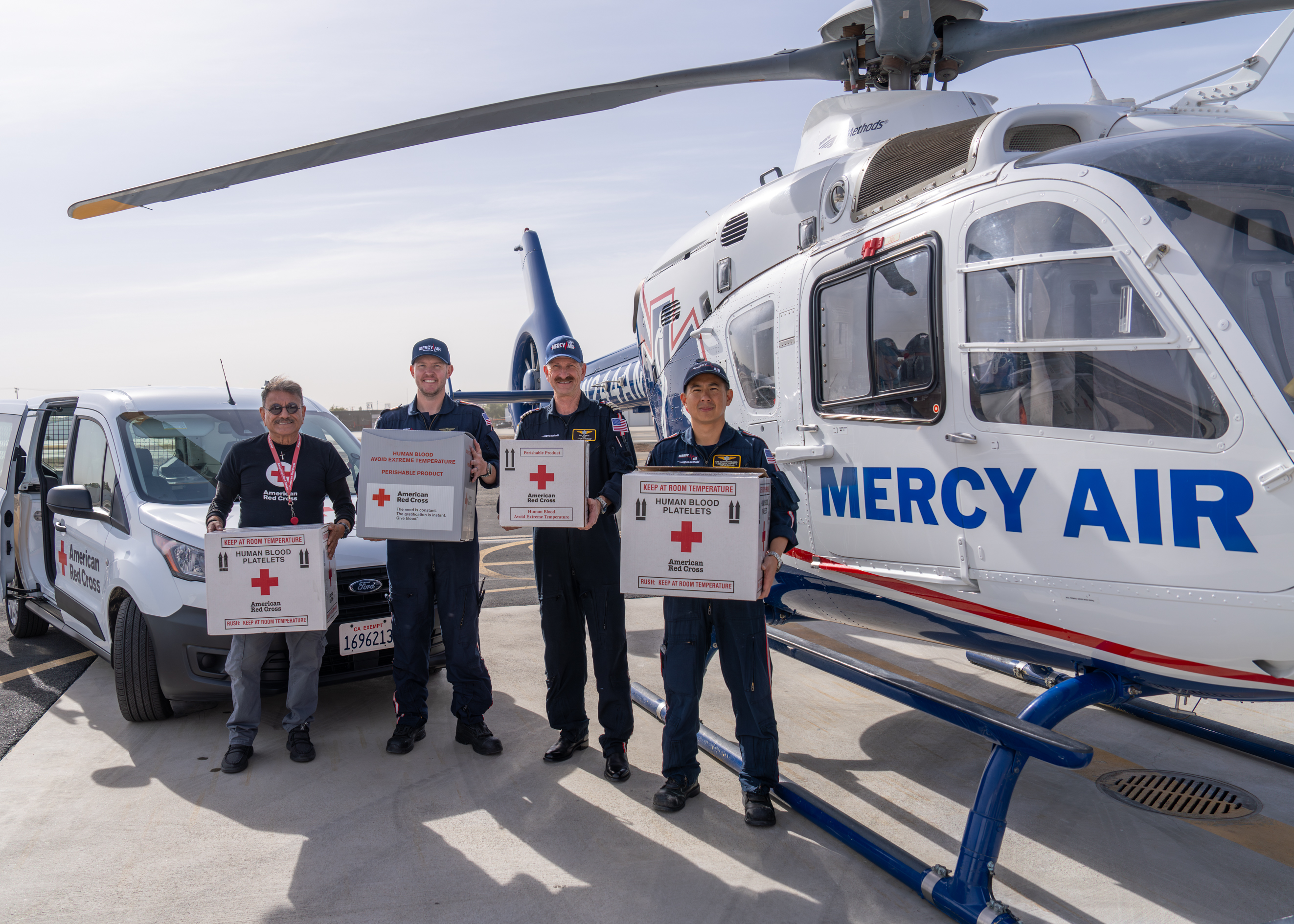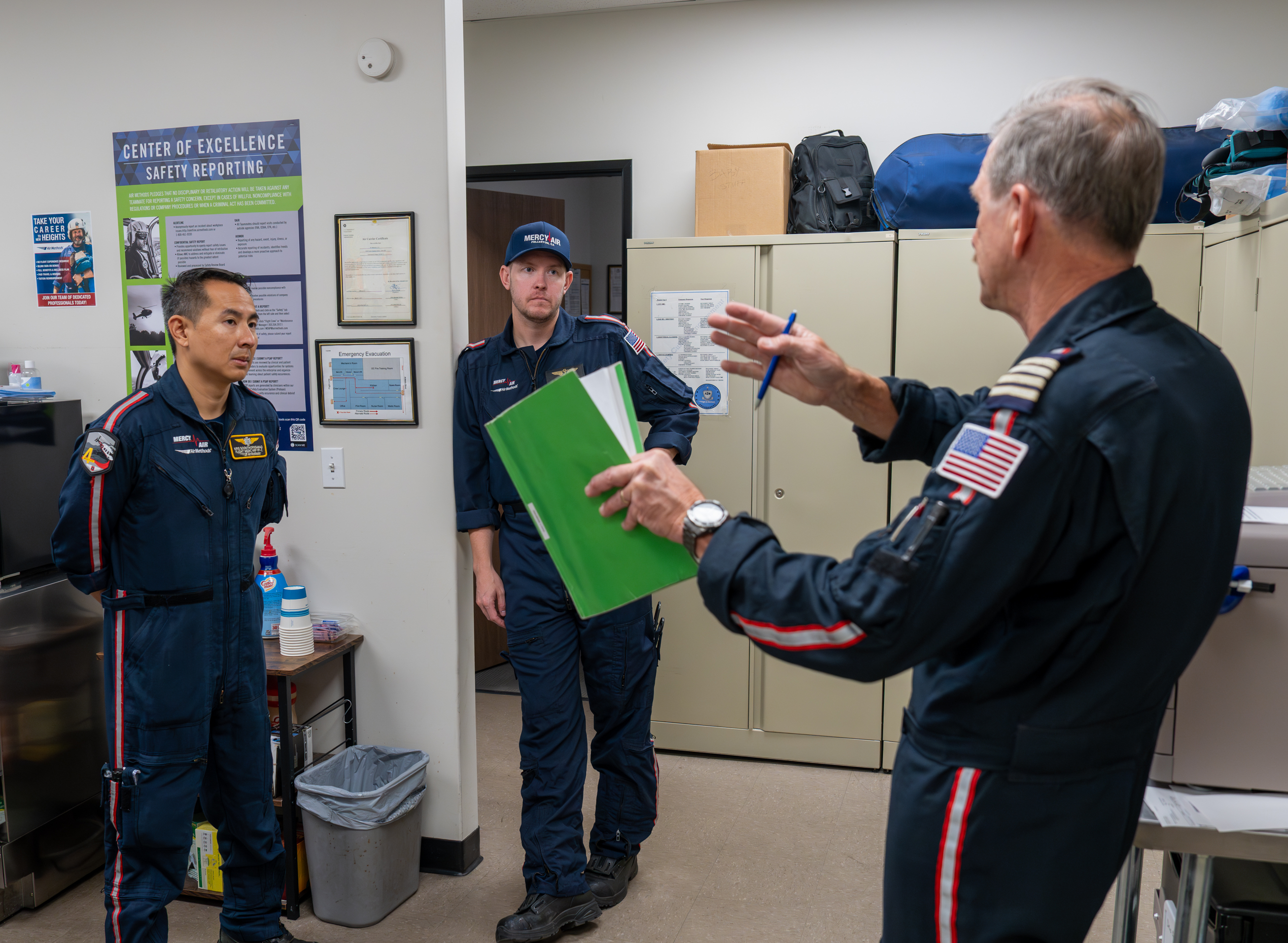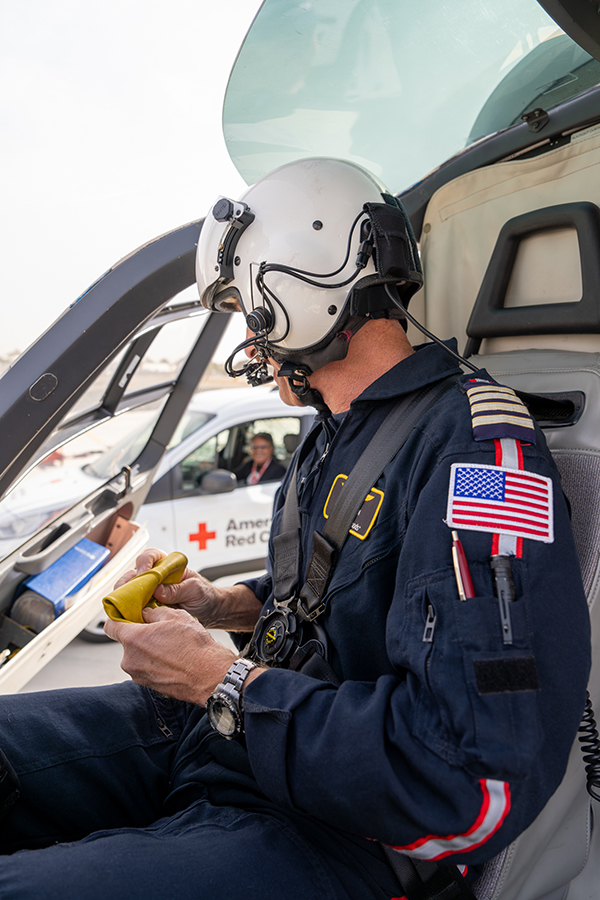
Pictured: Jon Shoemaker, with the Fullerton-based Mercy Air helicpoter crew, ensures lifesaving treatment is delivered swiftly. Equipped with Red Cross-supplied blood, medical teams provide immediate care to stabilize patients on scene. This partnership exemplifies how collaboration save lives, bringing critical care to even the most hard-to-reach places. Photos by Mimi Teller/American Red Cross.
By Patrick DeLaney/American Red Cross
Mercy Air helicopter crews provide critical, round-the-clock air medical transport across California and Nevada, responding to trauma calls, transferring ICU patients, and delivering life-saving care. Since 2020, a partnership with the American Red Cross has ensured emergency transfusion blood products are on board, thanks to Red Cross blood transportation volunteers and skilled Mercy Air medics, nurses, and pilots. Together, they form a vital care network, offering hope and survival when every second counts.
Jon Shoemaker has been a flight nurse with Mercy Air for over five years, drawing on a rich background as an Emergency Medical Technician and Trauma/Intensive Care Unit (ICU) nurse. Early in his career, he developed a strong interest in the “pre-hospital” environment—the critical care patients receive before arriving at a medical facility. Shoemaker finds his role as a medical flight nurse like ICU and trauma work, except now, the hospital comes to the patient.
Shoemaker generally works in 24-hour shifts, which see a balance of preparation and action. When not on a flight, he and his team are busy ensuring all medical supplies are ready for the next call. This includes managing the inventory of blood products delivered by Red Cross volunteers, which may include whole blood, packed red cells and fresh frozen plasma. Shoemaker and his colleagues store blood products in a state-of-the-art freezer, equipped with three thermometers to maintain precise temperature controls.
Mercy Air flights commonly travel with one pilot, one paramedic and one flight nurse. While some calls require an additional flight nurse in place of a medic, there must always be at least one nurse per mission. Each assignment falls into one of two categories: either an inter-facility calls or a scene call.
Inter-facility calls require Mercy Air to transport patients between medical facilities when specialized care isn’t available at the originating location. These missions may span Los Angeles County or cross state lines. The referring hospital designates the receiving facility where the patient’s needs can be met, and Shoemaker’s team must be ready to respond instantly. Their mission includes providing swift and secure transport while delivering critical care enroute, ensuring patients are stabilized and arrive in optimal condition for advanced treatment at their destination.
Scene calls, according to Shoemaker, are the true game changer in the partnership with the Red Cross. Having Red Cross blood readily available for patients in urgent need is a capability that wasn’t as reliably available in the past.
“If a fire department calls us to the scene of a motor vehicle collision, we are bringing hospital level service to the scene, starting treatments that before, patients would not receive until they got to the hospital,” Shoemaker explains. “We can be on the scene initiating that right away.”



Providing care on-site becomes especially vital in remote locations, such as an isolated stretch of highway or Catalina Island—a frequent destination for the Fullerton-based team—where access to critical care facilities is limited. Through its partnership with the Red Cross, Mercy Air can deliver immediate, lifesaving treatment on the scene using Red Cross-supplied blood. Once stabilized, patients are transported to care facilities best suited to their specific needs.
On busy days, Shoemaker and his team often accumulate substantial air miles, sometimes flying four or more missions in a single shift. Their work ranges from quick inter-facility transfers lasting just a couple of hours to more demanding scene calls requiring extensive on-site care, which can extend assignments for several hours. Despite the long hours and physical demands, Shoemaker finds deep purpose in providing critical care. Like the rest of the Mercy Air staff, he takes comfort in knowing they carry lifesaving Red Cross blood to every call.
When you donate blood at a Red Cross LA drive, your generosity sets in motion a powerful journey of lifesaving impact. At our Pomona lab, skilled technicians process, label, and prepare each donation for delivery to hospitals and medical partners like Mercy Air. From there, dedicated medical teams stand ready to provide transfusions, whether to a critically ill patient hundreds of miles away or thousands of feet in the air. This seamless partnership between the Red Cross and Mercy Air transforms every individual contribution into a lifeline, proving how collective efforts save lives.
About the American Red Cross:
The American Red Cross shelters, feeds and provides comfort to victims of disasters; supplies about 40% of the nation’s blood; teaches skills that save lives; distributes international humanitarian aid; and supports veterans, military members and their families. The Red Cross is a nonprofit organization that depends on volunteers and the generosity of the American public to deliver its mission. For more information, please visit redcross.org or CruzRojaAmericana.org, or follow us on social media.
Support all the urgent humanitarian needs of the American Red Cross.
Find a drive and schedule a blood donation appointment today.
Your time and talent can make a real difference in people’s lives. Discover the role that's right for you and join us today!